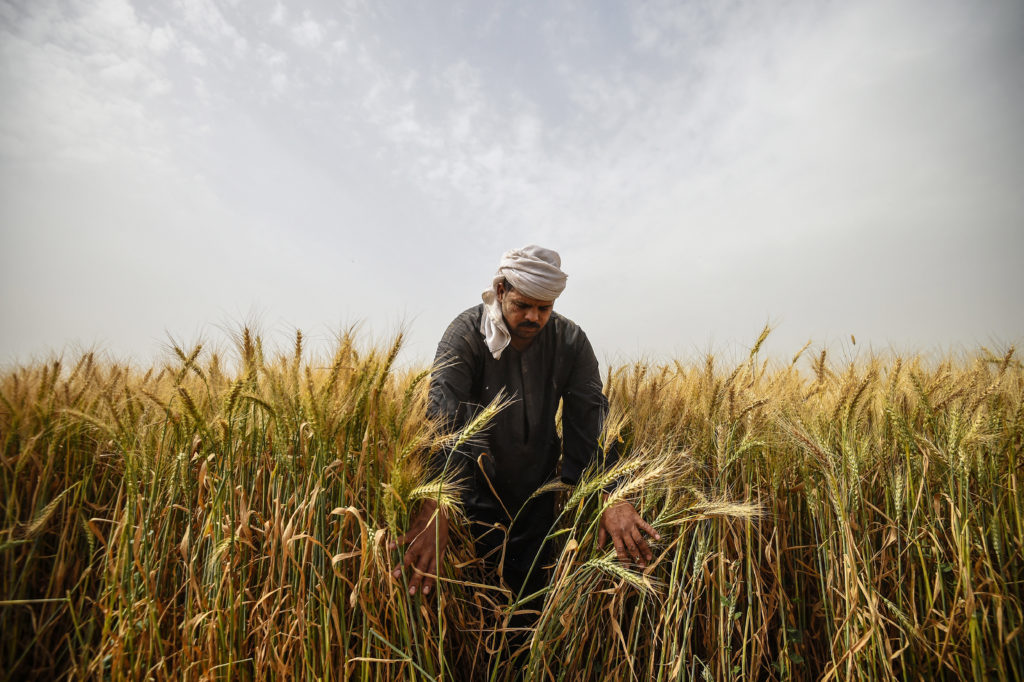Cairo – Egypt has restricted exports of five essential products to control rising prices and guarantee food supplies during Ramadan, which will start in April. Egypt’s Ministry of Industry and Commerce issued resolution 141, halting the export of wheat, lentils, pasta, broad beans, and flour. The measure is valid for three months and came into effect on Thursday (10). Pictured above, Egyptian wheat production.
The decision was taken in cooperation between the government and the private sector. The head of the Committee on Supply and Internal Trade of the General Division of Importers of the Federation of Egyptian Chambers of Commerce (FEDCOC), Matti Bishai, said the Russian-Ukrainian crisis has resulted in a significant increase in the price of some products Egyptian consumers cannot afford.
In a statement to ANBA, Bishai said the price of some goods rose in an exaggerated way, which is not within reach of the consumer, which motivated the Egyptian government to intervene to control the price surge.
The executive said all governments worldwide are currently working to provide food for their citizens and control inflation rates. Therefore, the resolution to ban the export of some essential products was already expected, as demand will be high during Ramadan. Ramadan is the holy period for Muslims, in which they fast during the day and dine at night.
Bishai explained the reason for the prices hike is rising raw input, shipping, and transport prices globally and the existence of an imbalance in supply chains due to the Russian-Ukrainian crisis. He believes, however, the surges were exaggerated.
Mostafa Madbouly, the current prime minister of Egypt, had a meeting on Wednesday (9) with business entities to form a crisis management committee. The committee aims to tackle obstacles at this stage, monitor markets, and maintain full cooperation between the government and the private sector. The measure could help make goods available at reasonable prices in this delicate period.
Agriculture and Land Recovery Minister El-Sayed El-Qusair said Egypt is working to make new agricultural land available, thus expanding the supply of essential products, especially wheat. Egypt’s annual wheat output is expected to reach 10 million tonnes this year.
The FEDCOC declared an extreme emergency to monitor and follow the markets, assess supplies, and intervene with the Ministry of Supply and Internal Trade in case of a shortage of strategic products.
Saad: Mechanisms for adjustments
Ambassador Nader Saad, the spokesman for the Council of Ministers, said the era of forced prices is over, the world lives in a market subject to the forces of supply and demand, and, at the same time, the mechanisms of the free market do not mean the government has lost control to reduce the increase in prices to the citizens.
Saad revealed there are mechanisms the government could use to control the pace of markets, the main one being the increase in supply in the next period to reduce the impact of prices, underlining the government could tighten control to avoid monopoly or retention of goods in the market to raise prices exaggeratedly.
Egypt’s Central Agency for Public Mobilization and Statistics (CAPMAS) reported a 2% increase in the country’s overall consumer price index in February compared to January. The agency attributed the surge mainly to higher prices for vegetables, beef, poultry, fruits, cereals, bread, bottled water, natural juices, dairy products, cheese, and eggs.
Translated by Ahmed El Nagari & Elúsio Brasileiro




